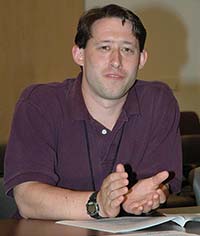Meet the IBEX Team: Ryan Tyler

When Ryan Tyler was choosing a college, he had two criteria in mind: the school he attended had to have an aerospace engineering major and a well-developed intramural hockey league. "I'm not sure to this day which of those things I put more importance on," he said.
In the end, he attended two universities, receiving a bachelor's degree from Rensselaer Polytechnic Institute and a Master's degree from the University of Michigan. "Both, by the way, have both aerospace engineering and intramural hockey," Ryan said.
Today, Ryan "limits" his hockey playing to three leagues before and after his work as a Systems Engineer at Orbital, where he oversees the technical design of the IBEX spacecraft. He makes sure that all the different parts of the spacecraft - rocket engines, computers, software, and more - work together during the mission.
"My top task recently has been studying the ability of our vehicle to get to its high altitude orbit. We launch into a very low orbit and then have to use our rocket engines to boost up to an orbit whose farthest point from Earth is almost as far away as the Moon. If our rockets under perform by just 3 percent, we don't reach a high enough altitude to do our mission. And if our rockets over perform by that same 3 percent, the spacecraft will escape Earth's gravitational pull altogether. So what I've been doing is coming up with an approach to make sure the rockets fire accurately by putting together a simulation of those events," Ryan said.
He really enjoys the "big picture" aspects of his job as systems engineer. "There are a lot of engineers in a lot of companies who are responsible for building some part of IBEX, maybe some microchip on one of our electronics boxes. In my position I don't end up working on those details, but I work on the big picture of how all those pieces come together to form a spacecraft that can perform groundbreaking science. So the best part of the job for me is really seeing it all come together and being a part of that," Ryan said.
Growing up in suburban Philadelphia, Ryan enjoyed creative writing more than math and science. At first, he thought he would become a teacher, rather than an engineer. "I always thought it was very important to teach kids how to think and analyze problems, not just how to memorize and recite facts. So for a while I wanted to come up with new ways to teach that would really train kids to think for themselves. Then, as I developed my interest in space, I moved away from the teaching idea and really wanted to have a part in space exploration," he said.
Ryan's older brother, now a physics professor in Colorado, helped him discover space science as a career. "Somewhere between my older brother and my enjoyment of sci-fi books and TV, I developed an interest in space exploration," Ryan said.
However, he still hopes to do some teaching. "I just got married, and my wife is currently considering becoming a teacher, and my brother is a professor. I've thought about how I would be a guest teacher in their classes, or, at least teach vicariously through them!" he said.
Ryan says that engineering uses a lot of the same imaginative skills as creative writing to find solutions to problems. "When I was young I always thought of engineering as being very complicated and requiring some advanced knowledge. Back then, I would look under the hood of my father's car and say, 'Look at all those parts!'" Ryan said.
"Well, these days, I look under the hood of my own car and I still say, 'Look at all those parts!' I really have absolutely no idea how my car works. But I don't need to. While there's definitely a place for the people who just know how to build things in engineering, there's also definitely a place for people like me who aren't naturally gifted in building things, but know how to logically solve problems.
"Actually, with all the people who become engineers because they're good at building things, the engineering field probably needs more people who break that mold and are more creative thinking people who can look at the big picture and solve problems," he said.
In fact, engineering may be just the career for creative people who want to be a part of scientific discovery. "I got into this field because I wanted to be part of learning. I don't think there's a better thing a person can do with their life than be part of expanding human knowledge. "IBEX is a mission of discovery, and will lead to humans knowing more about our place in our universe than we did before. I would just say that it's fairly personally rewarding to be part of something like that," Ryan said.
That is one reason why Ryan isn't going to give up his day job anytime soon for a hockey playing career. "I really like what I'm doing now, being part of designing a mission of exploration. There's lots of exciting science going on. I'd like to be part of that science, figuring out our place in the universe, discovering the origins of life, searching for Earth-like planets in other solar systems. There's so much interesting stuff going on. I didn't get into engineering because I think robots are neat. I got into engineering so I could be part of science and discovery missions like these, and that's what I want to keep doing," he said.